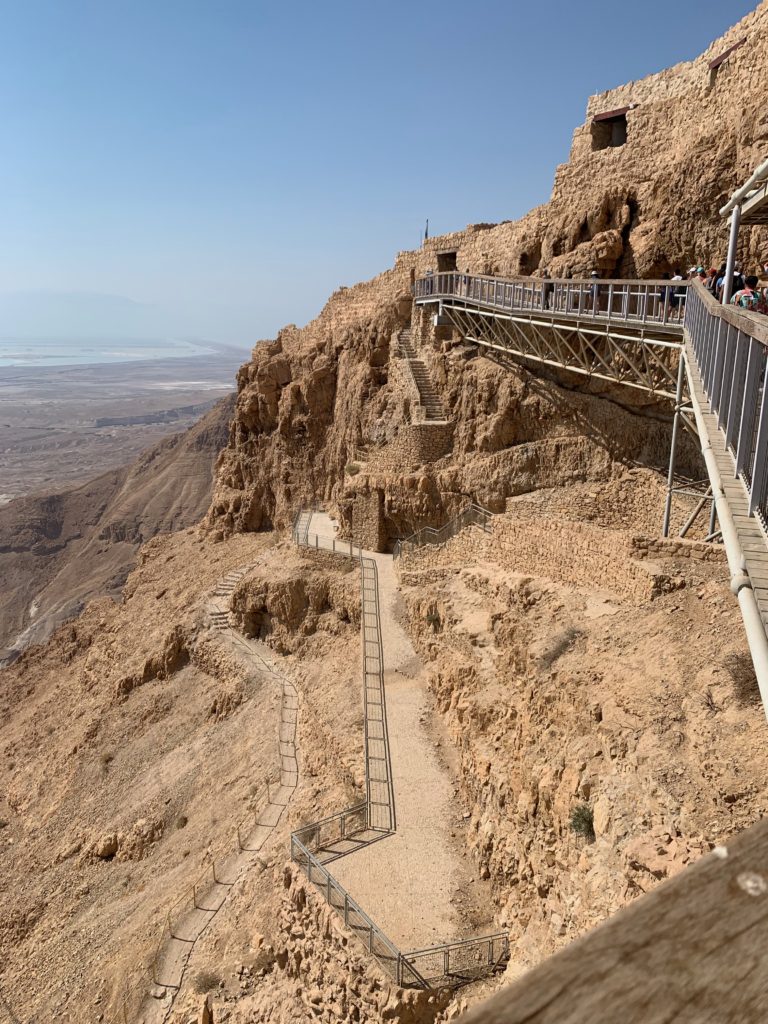“My old self has been crucified with Christ. It is no longer I who live, but Christ lives in me. So I live in this earthly body by trusting in the son of God, who loved me and gave Himself up for me.” (Galatians 2:20 NLT)
My body is here at home, but my heart is still on pilgrimage. I am haunted by the high places my feet have trod. One of those haunts is Masada.
Masada was built by Herod the Great. A Jew by faith and an Edomite by blood, Herod was never quite accepted as the Jewish king. Between his voracious appetites and mounting paranoia, he required a place to hide. Masada was his answer. He found respite in the wilderness, where he built a stone fortress that towered over the Dead Sea, a city complete with a palace that could observe potential enemies for miles and miles in any direction.

After Herod’s death, when the Romans set fire to the Temple and the Holy City, eight hundred Jews escaped to Masada. They were sustained by Herod’s leftover cisterns and storehouses. Of course, the bloodthirsty Romans followed, eager to wipe out a rebellious people. Masada proved initially impregnable. But Romans were bent on making an example. Twelve thousand troops surrounded the mountain, building camps on every side and concocting a plan to overtake the fortress. Slowly they began to build an earthen ramp; 1300 feet of dirt and rocks dragged into place to ascend the stone cliff. The construction took three years, Hebrew slaves doing the grunt work since the Jews atop would be reluctant to take out their own people. The towering runway would hold a battering ram, how many horses and pulleys would accommodate that incline? Finally, the Romans reached the summit and began to beat the gate of the fortress. The Jews set fire to the battering ram, which worked well to hold off the enemy until the wind turned and their own doors began to burn.
The day had grown long and the Romans went back down to camp for the evening, spirits high, confident in the victory that would come with the morning sun. The ill-fated Jews gathered with increased fervency. They derived and carried out a mass suicide pact. Their leader, Eleazar Ben Yair spoke these words preserved in history: “Let us make our own terms and die free… [maintaining] our first resolution of dying rather than submitting to slavery.” (The Zealots of Masada, Moshe Pearlman) The Jews perched atop Masada valued their freedom over their lives.
I’ve pondered their story for a full week now. I’ve found myself wondering if our attitude against sin shouldn’t be held with the same fierce conviction. What if, we too, would rather die than return to bondage? Perhaps we could hate the slavery of sin so bitterly that we are willing to let our flesh die before we indulge its appetites. Masada’s martyrs refused to bow to Rome and their pagan gods. We could refuse to bow to sin, refuse to slip our heads into the iron yoke of servitude ever again.
My husband has a saying; “Dead people don’t sin.” Honestly, I wince a bit to hear it. We too often forget that we are dead. Our flesh still makes loud demands and we are hard-pressed to meet them. But Paul makes it quite clear, we have died with Christ and the life we now live is Christ’s, not ours. We do well to abandon our flesh with the urgency and and obedience of the martyrs of Masada.
“Put to death, therefore, whatever belongs to your earthly nature: sexual immorality, impurity, lust, evil desires and greed, which is idolatry.” (Colossians 3:5 NIV)
“For me, to live is Christ and to die is gain.” (Philippians 1:21 NIV)
Lord, today let us choose death over sin, our own demise over disobedience. We’ve experienced firsthand how our transgressions defile relationship; divine and mortal alike, and we want no part of it. Righteousness is a worthy pursuit and You have provided for us fully by Your work on the cross. Give us the guts to die again. Amen.